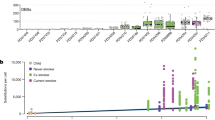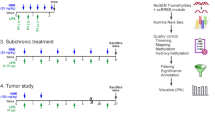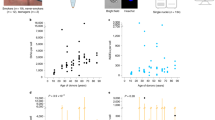Abstract
Epidemiological studies have firmly established that cigarette smoking causes almost all cases of anaplastic and squamous cell bronchial carcinomas1. It is equally well known, however, that many smokers do not develop lung cancer and, although the amount of tobacco smoked is undoubtedly the dominant risk factor, it seems possible that other factors may also be involved2. There is increasing evidence to support Boveri's3 old hypothesis that somatic mutation is an important event in the development of cancer4,5 and we have recently shown that cigarette smoke condensate (CSC) produces many dose-related lesions in the cellular DNA of cultured human lymphocytes as measured by sister chromatid exchange (SCE) induction6. Cytogenetic studies7,8 had previously shown an increase in chromosomal aberrations in blood lymphocytes of heavy smokers relative to non-smokers, but little9 or no8,10 increase in SCEs. We have now measured basal and CSC-induced SCE rates in lymphocytes from different individuals and report that smokers have higher rates than non-smokers and that smokers with untreated lung cancer have consistently higher rates than their matched heavy smoking controls. These results are in keeping with the somatic mutational hypothesis and the epidemiological evidence, but also raise questions related to difficulties in smoking dosimetry and to possible variation among different individuals' responses to a common insult.
This is a preview of subscription content, access via your institution
Access options
Subscribe to this journal
Receive 51 print issues and online access
$199.00 per year
only $3.90 per issue
Buy this article
- Purchase on Springer Link
- Instant access to full article PDF
Prices may be subject to local taxes which are calculated during checkout
Similar content being viewed by others
References
Royal College of Physicians Smoking or Health (Pitmans, London, 1977).
Wynne Griffith, G. in Scientific Foundation of Oncology, 245–255 (Heinemann, London, 1976).
Boveri, T. The Origin of Malignant Tumours (Williams and Williams, Baltimore, 1929).
Miller, E. C. Cancer Res. 38, 1479–1496 (1978).
McCann, J., Spingarn, N. E., Kobori, J. & Ames, B. N. Proc. natn. Acad. Sci. U.S.A. 72, 979–983 (1975).
Hopkin, J. M. & Evans, H. J. Nature 279, 241–242 (1979).
Obe, G. & Herha, J. Ham. Genet. 41, 259–263 (1978).
Evans, H. J., Hainey, S., Vijayalaxmi & Stephenson, R. (in preparation).
Lambert, B., Linblad, A., Nordenskjold, M. & Werelins, B. Hereditas 88, 147–149 (1978).
Hollander, D. H., Tockman, M. S., Liang, Y. W., Borgaonkar, D. S. & Frost, J. K. Hum. Genet. 44, 165–171 (1978).
Tokuhata, G. K. & Lilienfield, A. M. J. natn. Cancer Inst. 30, 289–312 (1963).
Harris, H. Br. med. Bull. 25, 5–13 (1969).
Author information
Authors and Affiliations
Rights and permissions
About this article
Cite this article
Hopkin, J., Evans, H. Cigarette smoke-induced DNA damage and lung cancer risks. Nature 283, 388–390 (1980). https://doi.org/10.1038/283388a0
Received:
Accepted:
Issue Date:
DOI: https://doi.org/10.1038/283388a0
This article is cited by
-
A population-based case-control study of the relationship between cigarette smoking and nasopharyngeal cancer (United States)
Cancer Causes and Control (1995)
Comments
By submitting a comment you agree to abide by our Terms and Community Guidelines. If you find something abusive or that does not comply with our terms or guidelines please flag it as inappropriate.



